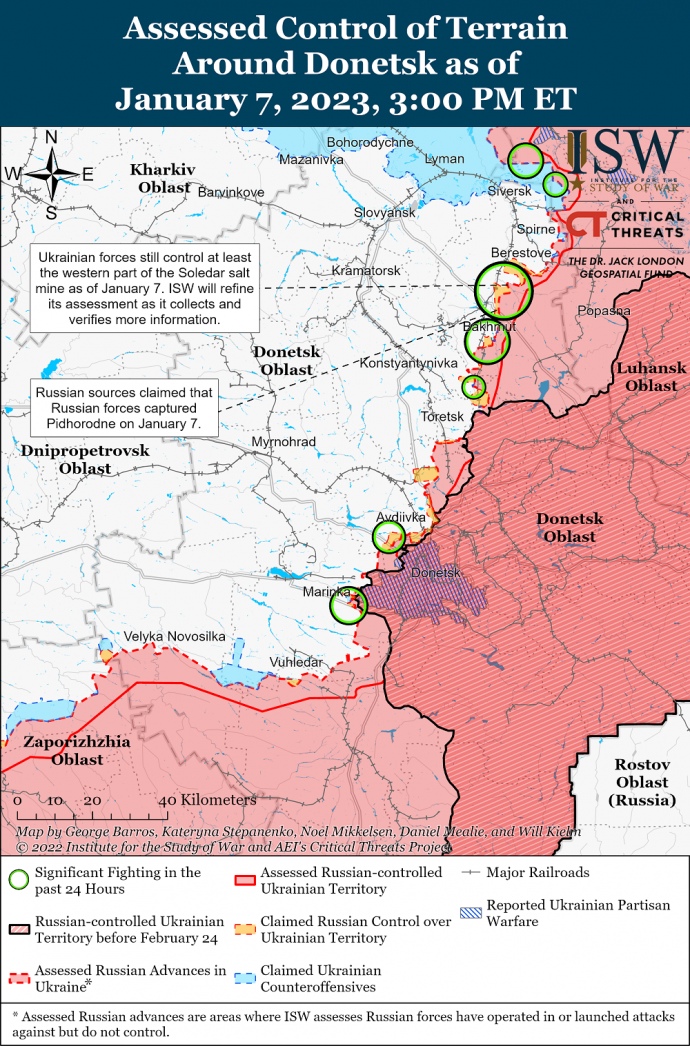Russian forces are far from “operational encirclement” of Bakhmut – ISW
The most recent report from the Institute for the Study of War (ISW) suggests that Russian occupation forces are far from an operational encirclement of Bakhmut, despite recent Russian gains in Soledar. Source: ISW Details: Recent Russian gains in Soledar do not portend an imminent encirclement of Bakhmut, contrary to claims made by Russian sources.
The ISW stressed that despite various announcements and reports, Russian forces are still far from being within striking distance of an operational encirclement of Bakhmut.
The institute said that in order to effectively cut Ukrainian ground lines of communication into Bakhmut, Russian forces would have to establish control of the T0513 Siversk-Bakhmut highway (currently 7 kilometres west of the furthest point of confirmed Russian advances in the Soledar area) and reach the E40 Slovyansk-Bakhmut highway (13 kilometres from the furthest point of confirmed Russian advance in the Soledar area) at least. "Considering that the recent rate of gains in this area has been on the order of a few hundred meters a day, at most, it is highly unlikely that Russian forces will be successful in cohering a mechanized push towards these [ground lines of communication] and move towards encircling Bakhmut," the ISW wrote.

The institute researchers also concluded that Russia continues to weaponise religion to "perpetuate long-standing information operations and discredit Ukraine."
We have launched English Twitter! Follow us!
The ISW report from 7 January suggests that Russian forces are continuing to deplete their missile arsenal but will likely continue to be able to threaten Ukrainian critical infrastructure and civilians at scale in the near term.
The Russian production of strategic missiles since the start of the invasion of Ukraine in comparison to the Russian military's pre-war stock highlights that Russia has not mobilised its military industry to support Russian military operations in Ukraine, the ISW said. A country would normally increase the production of missile, rocket, and other weapons systems and munitions before embarking on a major war and would normally put its military industry on a war footing once the war began, the institute explained, while "Russia has done neither." The ISW military analysts said that Putin's failure to mobilise Russian industry to support the Russian war effort in Ukraine may result from fears that further economic disruptions could produce further domestic discontent in Russia because Western sanctions regimes have placed significant constraints on Russian military industry.
Key takeaways from the ISW report:
- Recent Russian gains in Soledar do not portend an imminent Russian encirclement of Bakhmut.
- Russia continues to weaponise religion to perpetuate long-standing information operations and discredit Ukraine.
- Russian forces reportedly continue to deplete their missile arsenal and stock of Iranian-made drones but will likely continue to threaten Ukrainian infrastructure at scale in the near term.
- Russian and Ukrainian forces continued offensive operations near Svatove and Kreminna.
- Russian forces made marginal confirmed advances in Soledar amid continuing Russian offensive operations around Bakhmut and along the western outskirts of Donetsk City.
- Russian forces continue efforts to establish further control over the Zaporizhzhia Nuclear Power Plant (ZNPP).
- Ukrainian and European officials continue to warn that Russia is preparing for an imminent second wave of mobilisation.
- Russian occupation authorities continue to transport Ukrainian children to Russian territory under the guise of medical rehabilitation schemes.
Journalists fight on their own frontline. Support Ukrainska Pravda or become our patron!